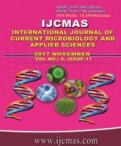


 National Academy of Agricultural Sciences (NAAS)
National Academy of Agricultural Sciences (NAAS)

|
PRINT ISSN : 2319-7692
Online ISSN : 2319-7706 Issues : 12 per year Publisher : Excellent Publishers Email : editorijcmas@gmail.com / submit@ijcmas.com Editor-in-chief: Dr.M.Prakash Index Copernicus ICV 2018: 95.39 NAAS RATING 2020: 5.38 |
An experiment was conducted to find out the effect of supplementing different levels of linseed oil in the laying hens’ diet on hen day egg production, body weight change, egg shape index and economics of feeding, during a period of 16 weeks. One hundred forty White Leghorn layers were randomly allocated into seven experimental groups having 5 replications of 4 birds in each and sited in individual cages from 22 to 38 weeks of age. The laying hens of control group (T1) were fed a basal diet formulated as per BIS (2007) standards. The layers of treatment groups T2, T3, T4, T5, T6 and T7 were fed basal diet supplemented with linseed oil at levels of 1, 2, 2.5, 3, 3.5 and 4%, respectively. The results of the study unveiled that laying hen fed diets of 2.5% linseed oil (T4) had (P<0.05) higher hen day egg production as compared to basal diet as well as the other dietary treatments. The results indicated a significant (p<0.05) increase in body weight in layers fed @ and 4% linseed oil as compared to control. Birds fed linseed oil had significant (p<0.05) increase in egg length and egg width in treatment group T5, T6 and T7 as compared to control diet. But feeding of different levels of linseed oil in the diet of laying hens did not affect egg shape index. The results showed that feed cost value per dozen egg production decreased in treatment groups T4 (2.5% linseed oil) as compared to all other dietary treatments. Birds fed linseed oil had significant (p<0.05) decrease in palmitic (C: 16), stearic (C: 18) and oleic acid (18:1) being lowest in T7 (4% linseed oil). Linoleic acid (C18:2) linolenic acid (18:3) and arachidonic acid (C20:4) significantly (p<0.05) increased being highest in T7 (4% linseed oil) and lowest in T1 (control). Thus, from the present study it can be concluded that supplementation of linseed oil at different levels in laying hens’ diet significantly (P<0.05), decrease average feed cost per dozen egg production and significantly (P<0.05) increase in hen day egg production, omega-3 fatty acid and body weight, whereas no effect of linseed oil supplementation on shape index.
 |
 |
 |
 |
 |